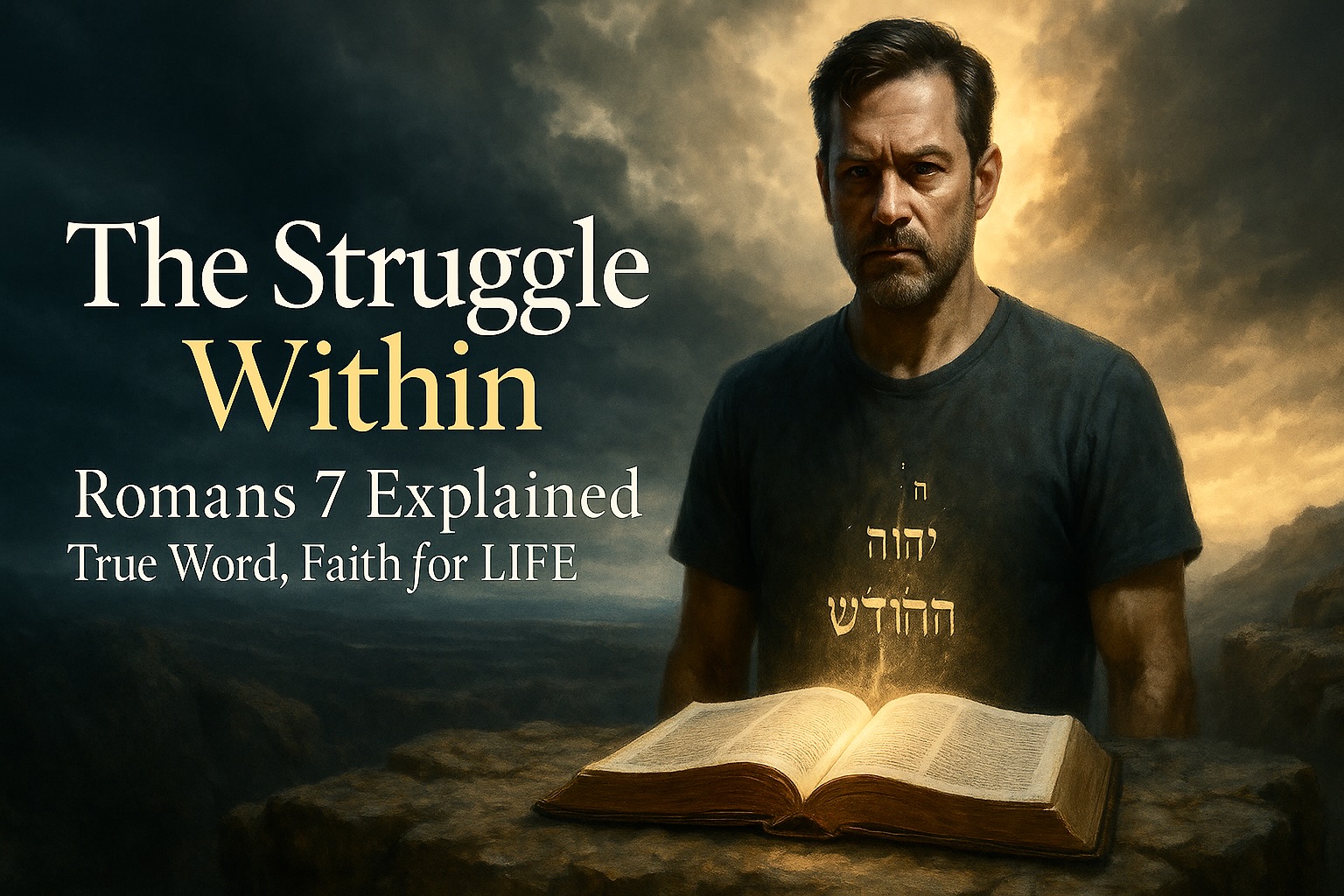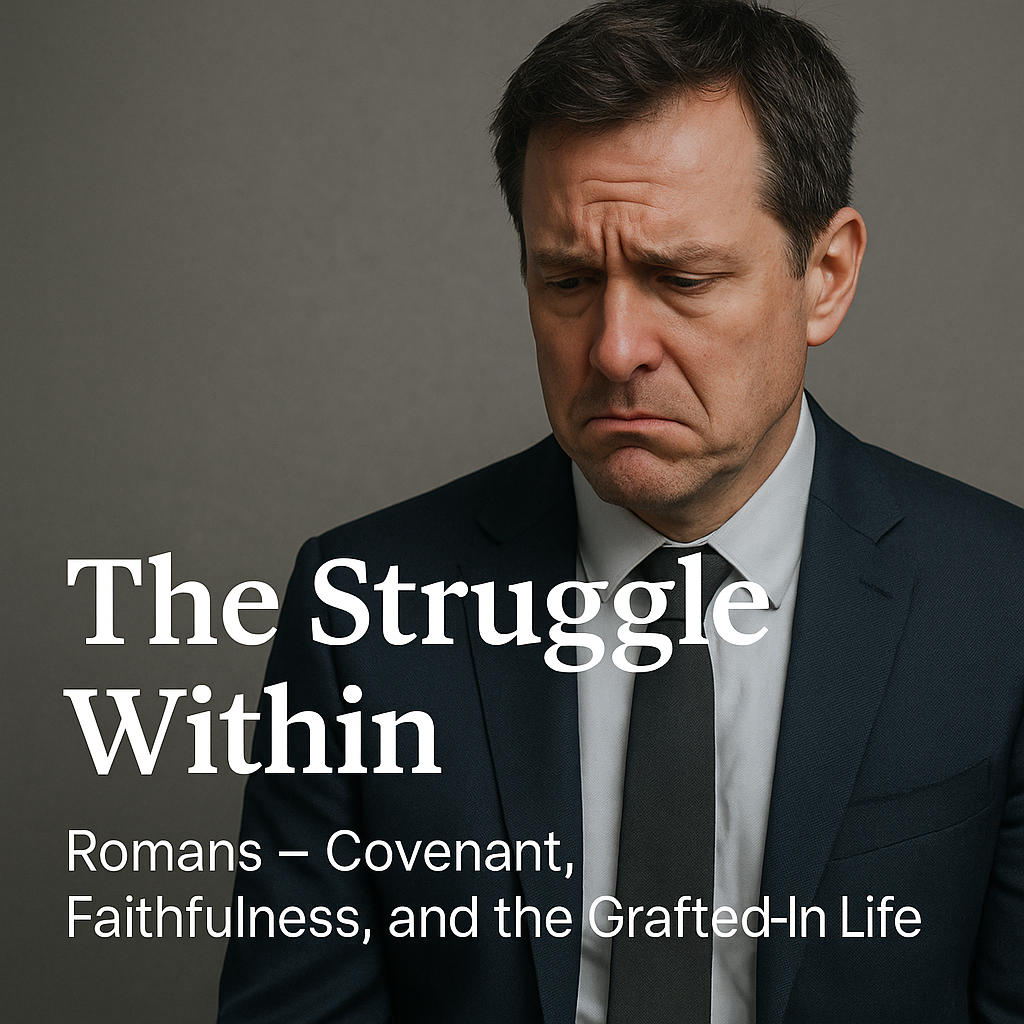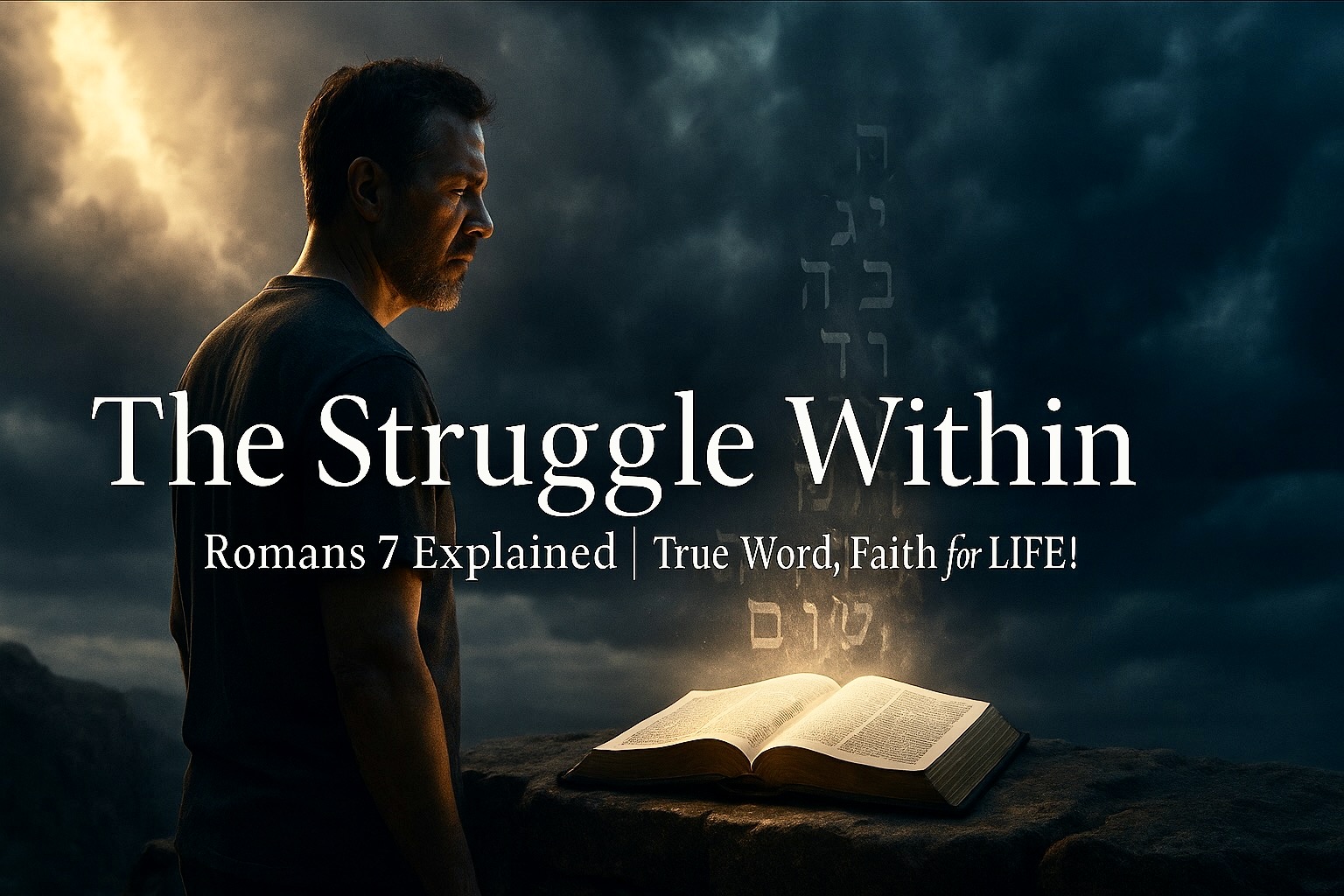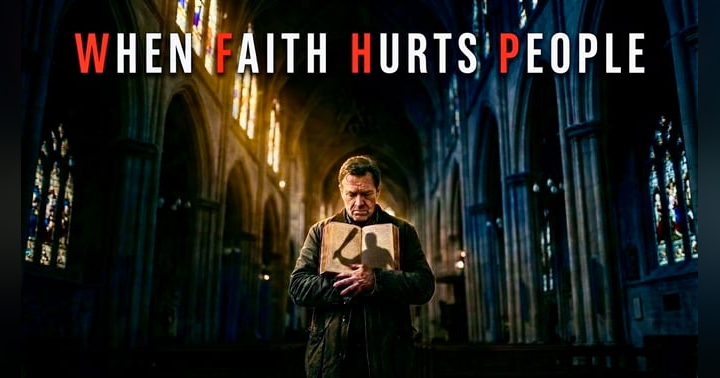The Struggle Within | Romans 7 Explained: Why Believers Still Battle Sin
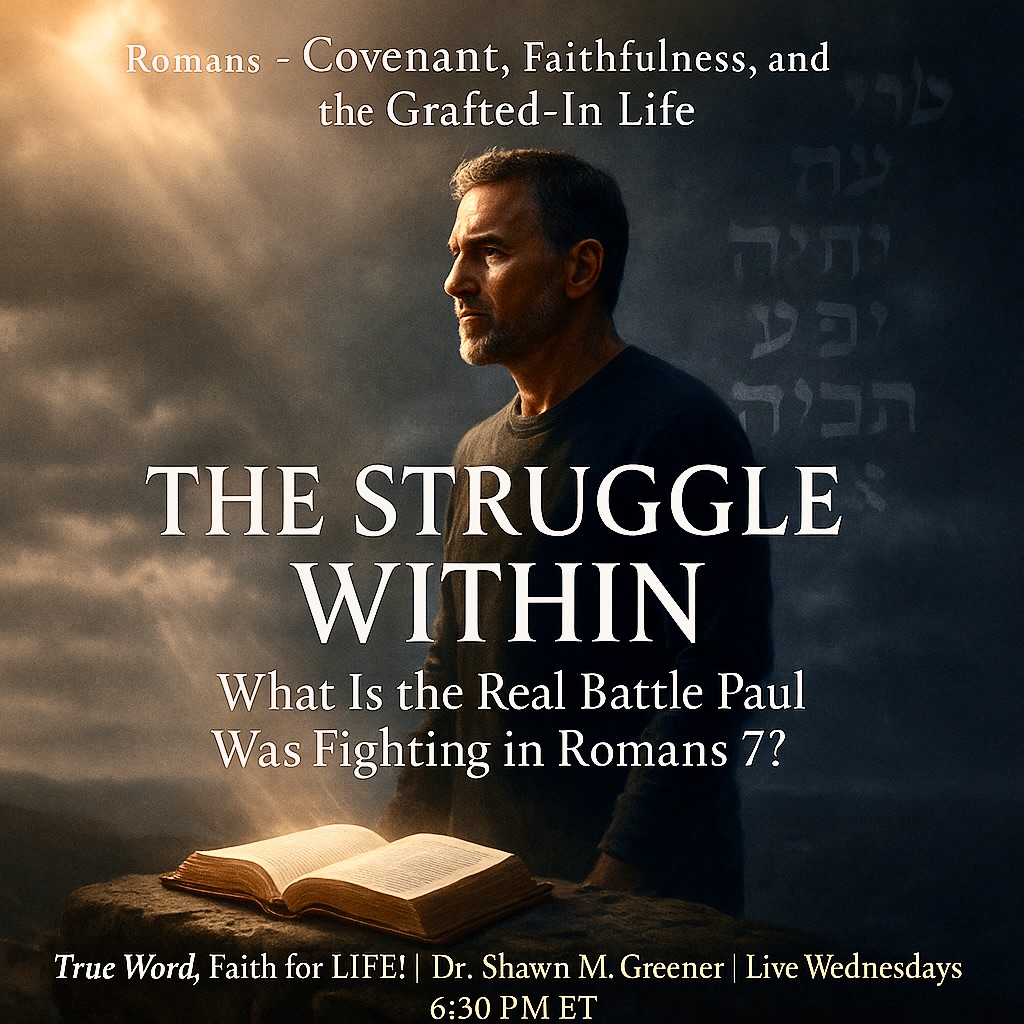
The Struggle Within: When the Battle Becomes Proof of Life
Discover why Paul’s cry in Romans 7 shows life, not defeat. Dr. Shawn Greener reveals the Hebraic truth of the battle between flesh and Spirit.
WATCH - Rumble: https://rumble.com/v71m53g-the-struggle-within-romans-7-explained-why-believers-still-battle-sin.html
YouTube: https://www.youtube.com/live/fFwX1z_gqOA?si=UvBK0bE2zsPlA4kG
Series: Romans — Covenant, Faithfulness, and the Grafted-In Life
By Dr. Shawn M. Greener
Have you ever felt torn between what you know is right and what you actually do? You want to walk in the Spirit, yet something in you still fights against the very thing you love. That is exactly where the apostle Paul found himself in Romans 7.
He cries out, “I do not do the good I want, but the evil I do not want is what I keep on doing.” It sounds like failure, but it is not. It is honesty. It is the voice of someone who finally realizes that holiness is not about willpower but surrender.
Paul stands between two worlds; the victory of Romans 6 and the freedom of Romans 8. He confesses that even a redeemed heart still feels the pull of an old master. The law (Torah, תּוֹרָה / to-RAH) shows us what covenant faithfulness looks like, but our flesh resists its beauty. And yet, this very conflict is proof of life. Dead hearts do not struggle. Living hearts do.
In the Ancient Near Eastern world, law was not a cold list of rules. It was covenant; a relationship written in instruction. Paul never blames Torah for his turmoil; he blames sin for twisting what is good. The Greek word ἁμαρτία (ha-mar-TEE-ah) means “to miss the mark.” Sin is missing the target of covenant loyalty. But even when we miss, the Spirit keeps guiding the arrow back toward truth.
Paul’s lament, “Wretched man that I am,” is not despair. It is discovery. It is the cry of a man who finally stops trusting himself and looks upward. And in that moment he finds hope: “Thanks be to God through Jesus Christ our Lord!” The same Spirit who revealed his weakness now breathes new strength into him.
Maybe you know that same struggle. Maybe you’ve prayed, “Lord, why do I keep falling into the same pattern?” The answer is not more self-control. It is deeper surrender. It is listening to the gentle voice of Ruach HaKodesh (רוּחַ הַקּוֹדֶשׁ / roo-AK ha-KO-desh); the Holy Spirit, who whispers, “You belong to Me.”
When Paul says the law is spiritual, he uses πνευματικός (pnyoo-mah-TEE-kos); Spirit-filled. The Torah is not our enemy; it is the Spirit’s instruction written in divine ink. The real conflict is not between law and grace, but between pride and dependence.
Think of your inner life as a courtroom. The Spirit speaks truth; the flesh objects; and you, sitting at the bench, must decide whose voice to obey. The verdict will always hinge on what you believe about your identity. You are not a slave to sin anymore. You are a son or daughter of the King.
Taco Tony would probably say, “Doc, if the battle’s still going, that just means the enemy hasn’t won.” And he would be right. The very fact that you fight proves that Ruach HaKodesh is alive within you.
So how do you live this out? Start by recognizing the battle. Stop pretending you are fine and confess where you fall short. Then rehearse who you are: say out loud, “I belong to Yeshua HaMashiach (yeh-SHOO-ah ha-mah-SHEE-akh).” Fill your mind with the Word. When temptation comes, answer it with truth, just as Yeshua did in the wilderness.
And when you stumble, return quickly in teshuvah (תְּשׁוּבָה / te-SHOO-vah); repentance; not out of fear but out of love. Grace does not ignore sin; it trains us to rise again. The Spirit does not shame us; He shapes us.
Romans 7 ends with Tension, but Romans 8 begins with Triumph: “There is therefore now no condemnation for those who are in Christ Jesus.” That is the bridge between struggle and victory. The war within is not proof of defeat but evidence of transformation. Every conflict is a classroom where the Spirit teaches you to rely on Him.
If today you feel the weight of that inner war, don’t run from it. Let it drive you to the feet of the One who already won. The same Jesus who set Paul free stands ready to free you. He is not disappointed in your battle. He is present in it.
Pray with me:
Lord Yeshua, I am tired of trying to fight this on my own. I bring You my weakness, my contradictions, my war within. Teach me to walk by Your Spirit. Write Your Torah on my heart. Replace guilt with gratitude and fear with faithfulness. Thank You that even in my struggle, You are faithful.
If that prayer reflects your heart, reach out to me at TrueWordFaithforLIFE.com/contact. You are not alone. I will personally help you take the next steps to live free.
Share this message with someone who is fighting the same battle. The struggle within might be the doorway through which the Spirit leads them to life.
Shalom b’Shem Yeshua.
© 2025 Dr. Shawn M. Greener. All Rights Reserved.
True Word, Faith for LIFE!
Now, maybe you missed this, but let's make sure you get this....
Romans 7:14–25 reveals something raw, something painfully honest. Paul—the same man who saw Yeshua face to face—confesses that he still struggles. He wants to do good, but sin pulls at him. He loves God’s Torah, yet he feels its mirror exposing what he hates.
This passage is not defeat. It’s discovery.
What if the war you feel inside—the pull between flesh and Spirit—is not evidence of failure but of life?
Dead souls feel no conflict. Living souls wrestle.
⸻
The War Within: Between Flesh and Spirit
Paul writes, “For we know that the Law is spiritual, but I am fleshly, sold into slavery under sin.”
In Greek, sarkinos (σαρκινός, sar-KEE-nos) means “made of flesh.” In Hebrew, basar (בָּשָׂר, bah-SAR) simply means “mortal body.” The flesh is not evil—it’s limited, fragile, prone to decay.
When Paul says he is “sold under sin,” he uses pipraskō (πιπράσκω, pee-PRAHS-ko)—a slave-market term. He paints a picture of humanity shackled, inspected, and powerless without redemption. In the Ancient Near Eastern world, redemption meant transfer of ownership. To be set free was to belong to a new master.
That is Paul’s point: Freedom doesn’t mean self-rule; it means new allegiance.
⸻
The Torah Is Spiritual
Paul calls the Torah “spiritual.” The word pneumatikos (πνευματικός, pnyoo-mah-TEE-kos) ties directly to Hebrew ruach (רוּחַ, roo-AKH)—breath, wind, Spirit. Torah (תּוֹרָה, to-RAH) comes from yarah (יָרָה, yah-RAH)—to aim or instruct.
The Law isn’t a burden; it’s divine instruction meant to guide covenant people toward holiness. Paul’s point isn’t Law versus Grace—it’s flesh versus Spirit.
The Law exposes sin the way sunlight exposes dust. You don’t blame the light for revealing what’s been there all along.
⸻
Taco Tony’s Take
Taco Tony: “Doc, if Paul struggled that bad, maybe he needed more tacos and fewer arguments!”
Dr. Shawn: “Tony, you might be right! The Law without the Spirit is like a taco shell with no filling—structure but no sustenance.”
Sometimes we starve spiritually because we debate instead of obey.
⸻
The Two Laws at War
Paul discovers two “laws” inside him:
1.The Law of God (nomos tou Theou, νόμος τοῦ Θεοῦ, NO-mos too theh-OO)—holy instruction.
2.The Law of Sin (nomos tēs hamartias, νόμος τῆς ἁμαρτίας, NO-mos tace ha-mar-TEE-as)—the rival ruler.
This is a sovereignty issue. Which law rules your heart?
Sin is not a behavior problem; it’s a kingship problem. Genesis 4:7 says, “Sin is crouching at your door; its desire is for you, but you must rule over it.” The Hebrew chattat (חַטָּאת, khah-TAHT) means both sin and sin offering. Paul’s image is profound—sin crouches, but grace stands.
⸻
The Cry of the Redeemed
Paul’s desperate question—“Who will rescue me from this body of death?”—echoes from the depths of Roman imagery. In that era, a murderer might be chained to his victim’s corpse until decay consumed him.
Sin is that corpse.
Then comes the shout: “Thanks be to God through Yeshua the Messiah!” (בָּרוּךְ הַשֵּׁם בְּיֵשׁוּעַ הַמָּשִׁיחַ, bah-ROOK ha-SHEM b-yeh-SHOO-ah ha-ma-SHEE-akh)
Paul’s chains fall. Grace breaks the tether.
Dr. Skip Moen once said, “Paul’s agony isn’t that he fails—it’s that he cannot escape grace even when he fails.”
That’s the gospel. Grace will chase you through the darkest corners of your weakness.
⸻
The War Is Proof, Not Prison
Romans 8 begins where Romans 7 ends: “There is therefore now no condemnation for those who are in Messiah Yeshua.”
The struggle isn’t condemnation. It’s confirmation. It proves you’re alive.
Flesh resists; Spirit persists. The war within is the Spirit’s way of reshaping your loyalties.
⸻
Five-Step Battle Plan
1.Acknowledge the War. Denying it gives sin home-field advantage.
2.Rehearse Your Identity. Say aloud, “I belong to Yeshua.” Identity is armor.
3.Renew Your Mind. Fill it with Romans 8:1–2.
4.Respond in Obedience. Speak Scripture when temptation whispers.
5.Rest in Grace. Grace isn’t permission; it’s power to return.
Every turn toward God is teshuvah (תְּשׁוּבָה, te-SHOO-vah)—a homecoming.
⸻
Covenantal Continuity
Romans 6–8 mirrors Israel’s story:
•Slavery – bound to sin.
•Deliverance – freed through Messiah.
•Journey – walking in faithfulness.
•Presence – indwelt by Ruach HaKodesh (רוּחַ הַקּוֹדֶשׁ, ROO-akh ha-KO-desh).
You are Israel renewed. Every temptation is another Red Sea crossing. Every confession, another manna morning. Every act of worship, a glimpse of the Cloud and Fire leading you home.
⸻
Taco Tony Returns
Taco Tony: “Doc, are you saying my midnight taco cravings are part of the flesh struggle?”
Dr. Shawn: “If the salsa’s calling you louder than the Spirit, maybe! Rule the small appetites, Tony, and you’ll be ready for the great ones.”
Obedience begins with small victories.
⸻
The Heart of the Battle
Paul isn’t describing defeat but growth. The closer we walk with God, the more aware we become of our weakness. Maturity doesn’t erase struggle—it magnifies sensitivity to sin.
The Hebrew phrase emunat Yeshua (אֱמוּנַת יֵשׁוּעַ, eh-moo-NAT yeh-SHOO-ah) means “the faithfulness of Yeshua.” His loyalty secures our standing. We fight not for victory but from it.
The Spirit’s conviction differs from the enemy’s condemnation. Conviction draws you closer. Condemnation pushes you away. Learn the difference—and lean toward mercy.
⸻
Challenge and a Choice
Stop calling your struggle failure. Call it formation. The pressure you feel is proof that the Potter’s hands are still shaping you.
You have a choice: keep fighting alone or surrender to the One who already won.
⸻
Prayer of Salvation
Heavenly Father, I come to You today with an open and humble heart.
I know that I have sinned and fallen short of Your glory, and I’m asking for Your forgiveness.
Right now, I turn away from my sins and turn fully toward You.
I believe that Jesus, Your Son, is the promised Messiah — that He died for my sins, was buried, and rose again on the third day just as the Bible says.
Today I call on Your holy Name. Please forgive me, cleanse me, and make me new.
Fill me with Your Holy Spirit and write Your truth on my heart.
From this day forward, I choose to follow Jesus as my Lord, my Redeemer, and my King.
Thank You for loving me, for saving me, and for making me part of Your family forever.
In the name of Jesus Christ, the King of Kings, I pray. Amen.
➡ “I am so excited for you because this decision is the most important of your existence! Contact me through TrueWordFaithforLife.com/contact and I will personally help you along the way.”
⸻
Before You Go
If this message stirred your heart, please don’t keep it to yourself.
Think of one person who needs encouragement or truth—send it to them right now.
Your share could be the tool God uses to rescue a soul.
If you don’t want to share, please email me at smgreener@gmail.com and tell me why.
⸻
Closing Words
The war within isn’t your prison; it is your proof.
Every sigh for grace is evidence of His Spirit.
Every “Lord, I still believe” is the sound of heaven fighting for you.
Rise again, beloved. The King who began the work will finish it.
Grace has the final word, and His name is Yeshua.
⸻
Shalom b’Shem Yeshua.
This has been True Word, Faith for LIFE! with Dr. Shawn M. Greener.
For more teachings, visit TrueWordFaithforLife.com.
© 2025 Dr. Shawn M. Greener. All Rights Reserved.
True Word, Faith for LIFE!
Study Guide – Romans 7:14-25 | “The Struggle Within”
Series: Romans: Covenant, Faithfulness, and the Grafted-In Life
© 2025 Dr. Shawn M. Greener. All Rights Reserved.
True Word, Faith for LIFE!
Summary
Romans 7:14-25 stands between the victory of Romans 6 and the freedom of Romans 8. It is the apostle Paul’s transparent admission that even a redeemed heart wrestles with the residue of sin. Using vivid ANE and Roman imagery, Paul depicts an inner courtroom where Torah reveals righteousness but the flesh resists obedience. His lament; “Wretched man that I am!” isn’t despair but discovery. It signals the awakening of a conscience ruled by the Spirit rather than by self.
In the Ancient Near Eastern world, “law” (torah, תּוֹרָה) expressed covenant relationship, not bureaucracy. Paul’s polemic dismantles the false assumption that Torah itself is the problem. The problem is slavery to sin; a rival kingdom that twists good instruction into guilt. The struggle within is therefore the believer’s battlefield of sanctification, not a mark of hypocrisy but of spiritual life.
Paul’s conclusion anticipates Romans 8: “Thanks be to God through Jesus Christ our Lord!” The tension of Romans 7 drives the believer toward dependence on Ruach HaKodesh (רוּחַ הַקּוֹדֶשׁ); the Holy Spirit, who alone empowers covenant faithfulness.
⸻
Key Hebrew and Greek Terms
Term | Pronunciation | Meaning & Context |
σάρκινος (sarkinos) | sar-KEE-nos | “Made of flesh.” Paul confesses human frailty, not moral worthlessness. In Hebrew basar (בָּשָׂר /bah-SAR/) denotes mortality and vulnerability. |
πιπράσκω (pipraskō) | pee-PRAHS-ko | “To sell or traffic as a slave.” Evokes Roman slave markets and Exodus imagery—bondage before redemption. |
πνευματικός (pneumatikos) | pnyoo-mah-TEE-kos | “Spiritual, Spirit-empowered.” Connects to Hebrew ruach (רוּחַ /roo-AKH/), God’s breath of life. Torah is Spirit-breathed. |
ἁμαρτία (hamartia) | ha-mar-TEE-ah | Sin, literally “to miss the mark.” In ANE archery idiom, to deviate from covenant aim. |
νόμος (nomos) | NO-mos | Law, authority, or principle. Can describe Torah (nomos tou Theou) or sin’s domination (nomos tēs hamartias). |
תְּשׁוּבָה (teshuvah) | te-SHOO-vah | Return, repentance, re-alignment with covenant relationship. Central to Hebraic discipleship. |
אֱמוּנָה (emunah) | eh-moo-NAH | Faithfulness or loyal trust. Not mere belief but relational fidelity. |
חֶסֶד וֶאֱמֶת (chesed ve-’emet) | HEH-sed ve-eh-MET | Steadfast love and truth — the character of God that sustains covenant partners. |
תּוֹרַת הָרוּחַ (torat ha-ruach) | to-RAHT ha-ROO-akh | “Law of the Spirit.” Paul’s phrase in Romans 8:2 describing divine governance replacing sin’s dominion. |
Polemics (πόλεμος /polemos/) | POH-leh-mos | The discipline of reasoned argument used to defend truth and expose error. Paul’s letters employ polemical diatribe to dismantle misconceptions. |
Discussion Questions
1.Identity and Slavery:
How does Paul’s image of being “sold under sin” reinterpret both Israel’s exodus and the Roman slave market? In what ways do modern believers experience similar spiritual bondage?
2.Law and Spirit:
Why does Paul insist that “the Law is spiritual”? How does viewing Torah as covenant teaching rather than regulation reshape Christian obedience today?
3.Polemical Method:
Examine Paul’s use of rhetorical questions in Romans 7. How do they reveal his mastery of polemics, and how can believers practice gracious argumentation in a polarized culture?
4.Conflict as Evidence:
How can inner struggle serve as proof of spiritual life rather than failure? Reflect on personal areas where conviction confirms growth.
5.Bridging Chapters 6–8:
Compare Paul’s progression: dead to sin (6), enslaved to struggle (7), free in the Spirit (8). How does this mirror Israel’s journey from Egypt to Canaan?
6.Modern Application:
What are practical ways to “walk” (halakhah) by the Spirit in daily decision-making?
⸻
Practical Application
1.Recognize the Battle.
Awareness of sin’s pull is the beginning of victory. Confession is not self-condemnation but alignment with truth.
2.Rehearse Identity.
Declare aloud, “I belong to Yeshua HaMashiach (yeh-SHOO-ah ha-mah-SHEE-akh).” Ownership breaks the slave mentality.
3.Renew the Mind.
Immerse yourself in Scripture. Replace internal accusation with divine affirmation (Romans 8 : 1-2).
4.Respond with Obedience.
Like Yeshua in the wilderness, counter temptation with the written Word. Spiritual authority flows through submission.
5.Rest in Grace.
Grace trains (Titus 2 : 11-12), not excuses. Every stumble is an invitation to teshuvah—returning quickly to covenant faithfulness.
6.Engage in Polemics with Love.
Defend truth without hostility. Paul’s example shows that holy argument serves restoration, not humiliation.
7.Remember the Hope.
Romans 8 begins where Romans 7 ends: no condemnation. The struggle within proves that Ruach HaKodesh is transforming you from glory to glory.
⸻
Footnotes
1.Michael S. Heiser, The Unseen Realm: Recovering the Supernatural Worldview of the Bible (Bellingham, WA: Lexham Press, 2015), 312–315.
2.Skip Moen, Hebrew Word Study: Revealing the Heart of God (Orlando: At God’s Table Press, 2013), 218–223.
3.N. T. Wright, Paul and the Faithfulness of God (Minneapolis: Fortress Press, 2013), vol. 1, 763–770.
4.Douglas J. Moo, The Epistle to the Romans, NICNT (Grand Rapids: Eerdmans, 1996), 434–440.
5.Craig S. Keener, Romans: A New Covenant Commentary (Eugene, OR: Cascade Books, 2009), 165–173.
6.David Instone-Brewer, “Slavery and Redemption in Paul’s Metaphors,” Tyndale Bulletin 53 (2002): 75–90.
7.John Walton, Ancient Near Eastern Thought and the Old Testament (Grand Rapids: Baker Academic, 2006), 85–97.
8.Complete Jewish Study Bible (Grand Rapids: Hendrickson Publishers, 2016), notes on Romans 7:14-25.
⸻
Bibliography
•Heiser, Michael S. The Unseen Realm: Recovering the Supernatural Worldview of the Bible. Bellingham, WA: Lexham Press, 2015.
•Instone-Brewer, David. “Slavery and Redemption in Paul’s Metaphors.” Tyndale Bulletin 53 (2002): 75–90.
•Keener, Craig S. Romans: A New Covenant Commentary. Eugene, OR: Cascade Books, 2009.
•Moen, Skip. Hebrew Word Study: Revealing the Heart of God. Orlando: At God’s Table Press, 2013.
•Moo, Douglas J. The Epistle to the Romans. New International Commentary on the New Testament. Grand Rapids: Eerdmans, 1996.
•Walton, John H. Ancient Near Eastern Thought and the Old Testament: Introducing the Conceptual World of the Hebrew Bible. Grand Rapids: Baker Academic, 2006.
•Wright, N. T. Paul and the Faithfulness of God. 2 vols. Minneapolis: Fortress Press, 2013.
Romans 7, Romans Bible Study, Paul the Apostle, Struggle with Sin, Spiritual Warfare, Law and Grace, Ancient Near Eastern Culture, Hebrew Roots, Torah and Grace, Bible Teaching, True Word Faith for LIFE, Dr Shawn M Greener, Yeshua HaMashiach, Christian Discipleship, Holy Spirit Power, Inner Conflict, Battle Within, Biblical Context
#TrueWordFaithForLife #Romans7 #BibleTeaching #SpiritualWarfare #FaithInAction #HolySpirit #FollowerOfTheWay #YeshuaHaMashiach #HebraicRoots #ChristianPodcast #RomansSeries
